Talk
December 28, 2020 – "Diaries"
I have been asked to write a short presentation of my former band Svart, which had its brief (but surprisingly important) existence in 1980-81. One song from our EP will reappear on a album. The details are fuzzy and I will believe it when I see it. It's fun though. Yesterday and today I have been reading old diaries from 1980 in order to see when and how things happened. It's interesting and rather scary, reading old diaries which were never meant to be read by anyone but me. The difference to internet and social media! Two main observations: 1. what an annoying character I was – and still I had friends. 2. There were at least twice as many hours in a day as there are now.
December 24, 2020 – "Eve"
It's Christmas Eve today, and we have not left Berlin and will also stay here for New Year's Eve. Which we normally never do. But this year... you know. I'm happy it will soon be over. It will not get better as fast as we wish, but it will... improve. Here a photo from my window, early morning three days ago. Since two weeks we have a PCR test centre in our backyard. Very convenient.

December 6, 2020 – "Breathless"
I managed to finish a novel, which had such a level of suspense that for days I had been struggling between wanting to read and not daring to read. It has no violence and no crime. None of the six main characters dies. A disaster is happening, but it remains remote and is never fully explained. The chapters are very short, and still I would always check just how long one is before starting on it, hoping it will be extra short. There is no happy end and no solution. It's one of the most striking books I have read in a very long time, but still I hesitate to recommend it, because the nerve it hits, is so hard to deal with. The book is called "Leave the World Behind" and was published in early October. Its autor is Rumaan Alam. I had never heard of him before. If you visit his website, the portrait photo he has chosen , shows him giving his baby child the bottle. Somehow, this is an important piece of information.
November 26, 2020 – "New"
There will be a new president in the USA (but how much will he be able to actually do?). There is a new Lockdown in Austria (which is supposed to end on December 7) . My department has a new exhibition at Galerie Hilger NEXT (which is temporarily closed but visible here). Rolf Maidhof has finished his work on making this website responsive to size of screen (he was able to do more than I had thought possible). I have just started to use a new version of Dreamweaver (which is scary). I'm working on lots of things yet it feels like time is standing still. Waiting for release.
November 5, 2020 – "Update"
The news arriving from America are so scary I hardly dare to look at them. In Vienna, where I currently am, we have also been confronted with dark developments. On Monday night, I walked through the area where some thirty minutes later a terrorist would randomly shot several people. Yesterday we all learned that one student at the university was killed. She was 21. An art student, jobbing as a waitress. Another student was badly wounded.
And yet, the update that I wanted to announce is that the work Rolf has done to this website (see below) is now more or less finished – and it works! Check this page, or any other page, in your mobile phone. It's a kind of magic. I am very greatful to him, and I know in my heart, that we all must continue working for what we know is valuable and good.
If only we could achieve re-alignment on what this is, instead of terror spreading.
October 29, 2020 – "Changes"
Not so long ago I contacted Rolf Maidhof again. In 2010 and into 2011 he helped me modernize and redesign this website by introducing CSS (Cascading Style Sheets – perhaps the most poetic tech term I have come across) to its existing pure HTML structure, which by then had been going for already 14 years. When he was finished I had to manually convert each of the thousands of individual pages to the new templates. But was it worth it!
Now we are at it again. Rolf has looked into his old CSS programming to see whether it will be possible to rewrite some of it in order to make the site "dynamic", i.e. to make it adapt to different screen sizes, so that reading it on a smartphone will be easier. What he has come up with looks extremely promising, and to me (who can't program) – like magic. I'm just about to write him an email to say "please go ahead and copy the new pieces of code into all the pages again". This time it will be possible to use "search and replace", but it's still quite an undertaking and there might be some time now when problems show up and ask to be dealt with.
October 25, 2020 – "Victory"
In-between reading far too much news from America in various digital newspapers (not on social media) I do find time for some books. This morning I finished Wolfgang Ullrich's "Siegerkunst" (Victor's Art, I think is the closest translation) from 2015. Why did I not come across it before? It's an astonishingly clear analysis of what has happened to the commercially successful part of art-making since the end of Modernism, whenever that was. In 2017 Ullrich published an essay called "Zwischen Deko und Diskurs" (Between Decoration and Discourse), which follows on from "Siegerkunst" and discusses how he sees a permanent split happening between (decorative) art for the super rich, and (theoretical) art for the academy. This essay I read back then, and we discussed it a lot in my class. This evening I began a new book by Ullrich: "Feindbild werden" (Becoming a Bogeyman, I think), which is about what it means to end up as the subject of a scatological and Hitler-referencing (terrible) painting by Neo Rauch, after having mentioned the same Rauch in an article looking at rightwing tendencies among former East German artists.
October 13, 2020 – "Mask"
In Berlin I went to Hamburger Bahnhof to see the show by Katharina Grosse and the retrospective by Michael Schmidt. I did know Schmidt a little bit, because Katrin knew him well (and her portrait from long time ago is in the show, a lovely image). Whenever we saw him at an opening or so, he used to say we should come and have lunch and drink Bordeaux wine with him one day. (Apparently he never drunk wine in the evening). I really wanted to, but time is endless until it isn't and we never did. And then he died. It's already six years ago. I really liked seing all the work. It made total sense and a lot of it really touched me, even though there was much sadness in it. The rest of the museum, however, didn't make much sense at all, today. There were the usual Beuys installations of stuff, a couple of rooms of very expensive pop art, the long wing building full of installations and video installations from the Marx collection – and Katharina Grosse's mega installation in the huge main hall. It even spread outside, extending perhaps a 100 meters of spraypainted paving and the painted outside wall of the wing building. But... it still felt so... tiny. And I am an admirer of her work, I have been absolutely excited from seeing individual paintings in other situations, one which was actually physically quite small. But now... I think it had something to do with my wearing a mask. It made the absurdity of certain agreements, on which contemporary art depends – impossible to avoid. Myself and all the visitors walk around masked, in order to protect ourselves and each other from a raging deadly virus, which in a short time has completely turned our worlds upside down. Totally brought us and our society off balance. Meanwhile, many of us are only too aware that this virus is far from being the most dangerous threat to our lives... I hear people are talking about something "climate"...?
Walking around in my mask, looking at different installations and noticing all sorts of layered ironies, I felt strangely distanced. Who does this regard? Why? I mean, really: why? Whereas in some/many of the photos by Michael Schmidt I simply couldn't ignore the presence of another human being. Either behind the camera or in front of it. No distance.
I found myself thinking about the tons of Styropor used by Grosse to produce her vision, which had not convinced me. I guess it can't be recycled.
October 2, 2020 – "October surprise"
I put my alarm at 03:00 for the night between Tuesday and Wednesday, in order to not miss the first debate between Trump and Biden in the US. After ten minutes or so, I turned it off. It was so awful. But I couldn't sleep, of course, so I had to turn it on again and suffer through. After which I again couldn't sleep. I gave up and had an early breakfast. It was two days ago. Why do we have to live through this?
This morning it was announced that Trump has caught Covid, along with his wife. Interesting.
September 20, 2020 – "Wave"
So... now we are seeing the second wave of the pandemic, in Europe. A few days ago Vienna was given risk status by Germany, complicating my planning for the coming months further. My university is intent on having presence teaching in the new semester (a decision I wholeheartedly support), which starts on October 1. There will be lots of restrictions though, and now travel comes with testing and/or quarantine. It's so hard to make clean plans, when you depend on fast changing government decisions (answering by necessity to the wordless wanderings of countless invisibile viruses) setting the parameters. Meanwhile the nightmare (for the world!) that is the American election on November 3 is drawing closer and the bottom is being pushed ever lower in preparation. I am finishing reading Peter Englund's five volume work (in Swedish, the translated version is shorter and in one volume: "The Beauty And The Sorrow: An intimate history of the First World War") on the 1914-1918 war, seen through the eyes of various participants. It's a chronological collage of short passages (1-4 pages) from letters and recollections written as it happened, soon or long after by various participants on all sides, whether soldiers or civilians. It shows that when things do go wrong on a wider societal scale, there is a long, long, long way to the bottom. It has been a deeply worrying, and strangely therapeutic read, because after all, most of these voices survived and rebuilt their lives. Until the next catastrophe arrived.
Actually, what I did want to note this morning, is that I have uploaded a series of 12 strong photographs of my STOA169 column. I'm so proud of this work, it has come out even better and more striking than I had imagined. And I am always very optimistic – for my work.
September 16, 2020 – "Capriccio"
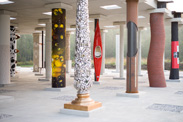
Here is a link to a segment of the rather famous (I learned) culture program on Bavarian Television "Capriccio". Along with a couple of colleagues, I get to introduce my work in (broken) German, and there are good overview images of the Säulenhalle.
September 11, 2020 – "Fearless"

Tomorrow I return to Polling, in order to be present at the opening of stoa169 on Sunday (13.9). I finished building my column two weeks ago, under rain. It was difficult to get good photos of it then, and anyway Pascal, the bricklayer, was going to continue cleaning it after I left. For now, you can look at the image illustrating the article in F.A.Z. from yesterday. And stoa169, of course, has a good website and is active on Instagram. About 80 of the planned 121 columns are finished now. The rest will follow next year. To put it very briefly, this is an extraordinary project, especially at this moment in time. It's idealistic and crazy, innocent and high-end, beautiful and subversive, fearless and so very generous. I'm delighted to be part of it.
August 21, 2020 – "Polling"
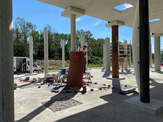
Had he lived, Man Ray would have been 130 years old today. Myself, I am in Polling working together with bricklayer Pascal Marturella on my column for Bernd Zimmer's Stoa169 project. This is what it looked like yesterday afternoon.
August 27, 2020 – "Poison"
More from Masha.
August 20, 2020 – "Now"
Of all that's going on right now, this is Masha Gessen reporting two days ago from a country in Europe called Belarus.
August 15, 2020 – "Heat"
In mid June Katrin had a bicycle accident. It happened while I was in a zoom meeting, a diploma
examination where I was part of the small jury. She phoned from the street, while waiting for the ambulance. I didn't pick up the phone. She then phoned Edvin, sitting at his computer in the room behind me, and he did. And made it clear to me I would have to interrupt. We jumped into the car and made it just in time to see her being picked up. We picked up her bike. And I had to to return to my jury. Later that day we saw her at the hospital post-op. Her foot was badly hurt.
She is recovering fine, but it is a long way to go. Because of this, all plans for summer were turned upside down and we have spent most of it in our apartment in Berlin, just as we did before the accident – for another reason. You adapt. Everything could have been much worse. Life is fragile. And it is hot.
Both life and society are fragile, as has been demonstrated in so many ways this year. I am reading now, and Katrin has as well, Martin Hägglund's "This Life". In this book Hägglund, who is a professor of comparative literature at Yale University, takes on the big question of what gives meaning to life and finds, that it is that it will end. This is the short version. The book is long, careful and passionate. I feel happy to be reading it. It is valuable.
For those of you who speak Swedish I highly recommend Hägglund's "Sommar" radio program which was sent a week or so ago and is available as a podcast. His theme is the same, yet following the format of the legendary 90 minute program, it is interspersed with his own choice of music. I was driving alone while I listened to it and I it constantly triggered new ideas and inspirations for my own struggle with making sense of art, and life. I recorded them and am looking forward to get to work. If only it could be less hot. Speaking of which, a few days after Katrin's accident Greta Thunberg presented her "Sommar" program. There's a Swedish version, as well as an English version.
June 30, 2020 – "Astonishing"
The month of June arrived and disappeared in a stationary whirlwind. Lock-down is over now for some time already, but normality has changed. One week ago I traveled for the first time since early March. I spent three days in Vienna, meeting students and colleagues outside, in parks and in a Heurigen (outdoor wine garden). The first such meeting felt almost surreal, because here were these people I had beeen congregating with on a screen every week for three months, and now they were... real! But one gets used to reality too. The new normal. For the end of the year exhibition of the whole university, the Angewandte Festival, most of the students in my class exhibited videos made at home (or wherever they found themselves confined). The only rule for what and how, was: no longer than two and a half minute. I think the result is astonishing.
May 31, 2020 – "High"
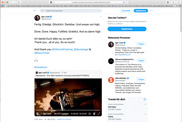
I overslept with one hour the end of Vexations. Vexing, indeed. I then found out it was possible to see the finishing sequences after the fact. In the screenshot of Levit's Twitter, he is playing the final bars. After which... he was elated. So damn high!
May 30, 2020 – "Necessities"
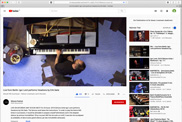
Some projects impose themselves and become necessary, no matter the circumstances. If this wasn't so, there would be no art – and music – and we would all be much poorer. Igor Levit is more than eighth hours into playing and live-streaming "Vexations", which he started doing at 2 pm today, somewhere in Berlin. I saw him begin, and I have been dropping in on the stream on and off ever since. It would drive me completely crazy to be there for all of it. Now I'm going to read some and then sleep. First thing in the morning I will check in with how it is going. I'm usually up early, I don't think he will be through yet. 840 times a short motif. Repetition is the foundation for all art – and music – and life.
May 19, 2020 – "More"
I want to make note of two more articles published because of Florian Schneider's passing. "Boing, bum, tschak" and "The enduring influence of Kraftwerk" (scroll down for registering).
May 16, 2020 – "Values"
Florian Schneider died recently, as you will know. Just now I was looking for an article I wrote about the last time I saw (post-Schneider) Kraftwerk in Berlin 2015. I googled myself, and it didn't show up. Strange. I then realized that at the time I had not published it here, as it was written for frieze d/e's blog. This no longer exists. I therefor looked up the original textfile and have now published the text here, for the frist time. "Fundamental Values Corrected".
May 2, 2020 – "Truth"
Normally I don't mention university projects here, but all rules live from exceptions. As it was announced (on March 12) that Austria would enter lock-down and close its universities on March 16, fourteen students from my class at the Angewandte was about to open a show a few days later at a prestigious gallery: Hilger Next. First we thought it would still be possible to beat the restrictions coming in, and open the show, albeit without an opening. But no, there came a series of further announcements, one sharper than the other, which made all hope disappear. Until a short time later the gallery made it clear the show is now re-scheduled for the end of the year! And that they wanted us to provide a trailer for their social media feed. I gave the task of doing this to the one student in the group, Elizaveta, who also works with video. After some debate among the whole group it was decided she would use selfies and material sent to her from the other participants, in their various locked-down locales. When I saw the result I was simply astonished. See it for yourself on vimeo or youtube, or at hilger next on facebook.
April 24, 2020 – "Bunker"
Nearly two weeks have passed, and I already forgot most about how. Yet I have been working, every day, and there has been so many video conferences and at the end of a day there's usually surprise at how short it was.
I finished reading Camus' Plague and it sure made an impact, but I found it somewhat stilted too, perhaps burdened by its metaphors and content. I noticed all the protagonists are men. There is not one woman with an independent voice in the book, in fact there is only one single woman who says anything at all and that's the mother of the main character, the doctor Rieux. I became aware of this lack of balance early on and once I had, I couldn't forget it and then it just went on like this. Another thought, more mundane but hard to ignore, given the circumstances surrounding me as I read the book, was that here's a city completely cut off from the surrounding world for almost a year... and there is hardly a mention of logistics and subsistence. Food continues to be there, hospital stuff and everything needed. Strict guards at the gates keep inhabitants from leaving, but deliveries apparently keep coming, undisturbed. No hoarding needed. And no questioning of the chain of command. Of course no media either, except local newspapers and radio.
Some things are different today, although some goings-on give eerie reflections of déja-vu. Upon reading this article in today's New York Times I got an immediate association to this film, and the book that spawned it. After all, the bunker that book and film are talking about is around the corner from where I live. Which doesn't mean so much today, as everything has become a presence everywhere. If you want a more humoristic take on the unfolding disaster, there is no one better than Andy Borowitz to deliver it. Like in this distinct analysis of a president's state of mind from a week ago.
April 6, 2020 – "Twentieth sheet"
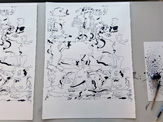
I reached the end of the drawings. The final one looks like this. Europe involved in a contorted dance with itself. On the same day it became known that Boris Johnson, the premier of Great Britain, was now in intensive care, after ten days of uninterrupted corona fever. I'm not a fan of Boris Johnson and certainly not of his political project, but these news really made quite an impact. Anyone can be unlucky.
April 5, 2020 – "Nineteenth sheet"
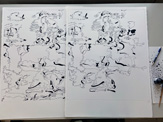
Just one more drawing, and then I will have the twenty that I need.
April 4, 2020 – "Eighteenth sheet"
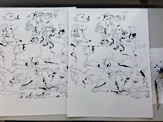
It's a quiet spring Saturday in Berlin. The sky is beautiful, but it's still crisp. I have been to the studio by bike, and now I'm back home again. I haven't met with anyone, of course, and when I bought food in a supermarket I put on a facemask. That's new for me. It's not (yet?) obligatory here. Sincer Wednesday it is in Austria and I have come to think it makes sense.
Before I left in the morning, I checked the numbers on the Johns Hopkins site and now I will do again. I don't need to give the link. You all have it. If you don't know what I'm talking about, you must be reading this at some point in the future, when that site is no longer up. Be happy for that. I realized today that this collective obsession with checking the numbers is wartime behaviour. I thought about my parents (born 1932 and 1933) and their parents during WW2 in neutral Sweden. Following the news. Reading the numbers.
April 2, 2020 – "Seventeenth sheet"
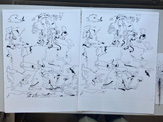
After today I have three more drawings to go. Then I will photograph all of them and process the photographs so that all greyscales disappear and leave only black line and surface on zero colour white. After which I will add a colour (in photoshop) to each country of the EU, beginning with the first sheet. This is the fun part: you slowly see the actual story being revealed. Finally, I will deliver the files to be printed out, in scale 1:1. If the printing company is working.
April 1, 2020 – "Sixteenth sheet"
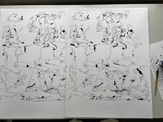
I was accosted by a television crew upon leaving the supermarket. They wanted me to answer a question on camera and I said yes. "Did I find everything I had planned to buy?". "Yes". I showed them a pack of toilet paper which I had been looking to buy, but which had been available. "Are you worried about getting everything you need for Easter?". "No, but who knows how this will develop?".
Nobody knows, really. We are in unchartered waters. The actual numbers of deaths caused by the epidemy so far, may not be that high in relation to the respective populations. But each death is surrounded be berieved family and friends and cause uncontrollable ripple effects through the social fabric. I read today that the projected losses in the USA, now accepted also by their president, will be higher than the combined losses of Americans in the wars in Vietnam and Korea combined. Who knows what other comparisons we will see before this has calmed down?
March 30, 2020 – "Fifteenth sheet"
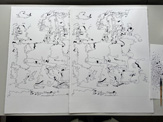
Today it snowed heavily for ten or fifteen minutes. Then it was gone. Things just happen. To make the psycho-mapping drawings feels like some form of torture, yet I'm very grateful that I have to do them now – the final work will be shown in a big exhibition in Moscow later in the year. Thanks to the present circumstances I have more time for them than I would otherwise have had. I can't travel. I'm getting used to it.
March 28, 2020 – "Fourteenth sheet"
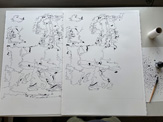
A Swedish friend sent a message today. He's in Berlin and tries to return to Sweden. Easier said than done. Trains through Denmark are not possible: border closed. SAS has simply stopped flying. Easyjet has three or four flights a week and they are all fully booked through April. (no longer – on March 30 they stopped all flights) Still possible, it seems, to take a train to Frankfurt and a flight from there. Or train to Rostock – ferry to Trelleborg – more trains in Sweden. This is not what we have gotten used to. It's like in the old days. Travelling as something out of the ordinary. Not a right.
March 27, 2020 – "Thirteenth sheet"
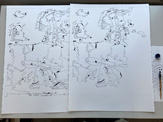
The US is becoming the new epicenter of the epidemy. It was expected, which doesn't make it any less tragic and dangerous.
This morning I finished "Uncanny Valley" by Anna Wiener. I'd recommend it to anyone who is trying to understand why things are like they are, these days. (not necessarily about the virus)
Tonight I will begin (re-)reading a book by a certain Albert Camus. Guess which one. No prizes.
March 25, 2020 – "Twelfth sheet"
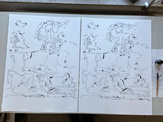
As you can see from these maps, the state (the states?) of Europe remains twisted, chaotic and peculiarly stable.
March 25, 2020 – "Minority lesson"
Can the current never-seen-before measures taken against the Covid-19 virus by governments worldwide, be seen as test runs for the necessary large scale changes to our societies, which need be made in order to mitigate the climate crisis? Or are they rehearsals for authoritarian interests' deconstruction of democracy and rule by decree, in the name of ever impending and renewed disasters? There is an interesting article in the Swedish newspaper Svenska Dagbladet today, which notes that Sweden's "calmer" approach to virus containment (schools and restaurants remain open, meetings up to 500 allowed, etc) is now shared only by Belarus in Europe, after the UK and the Netherlands began closing down. So far, Sweden's infection rate and death rate, remain relatively low. Will it stay this way? What will be the lesson here?
March 23, 2020 – "Eleventh sheet"
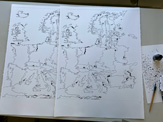
This Monday restrictions were made harder in Berlin (and in Germany): no more than two people can congregate on the street, and they will have to respect social distance. Whoever leaves home, which is only allowed for absolutely necessary tasks, needs to carry identification and a document showing their address. I was not surprised. Yesterday I bicycled with K and E (allowed, because we're a family group) to a park, Gleisdreieck. Lots of people there. Not as many as in normal times, but far too many who completely disregarded any social distancing, or limiting groups to less than ten (the old rule). This will not hold, I thought. A few hours later, rules were tightened.
While this is going on, I'm in email contact with an old friend, the painter P, who is working in a residency studio on a hill in beautiful Tuscany... wondering when he will be able to go home to Scandinavia. Beauty is not all there is.
March 21, 2020 – "Tenth sheet"
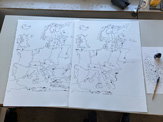
There are more than twice as many who has tested positive in Germany today, compared to three day ago, when I drew the sheet before today's. Still a very low death rate – in Germany. In other countries much higher. Lots of mistakes of proportion in my drawing today.
March 19, 2020 – "Address"
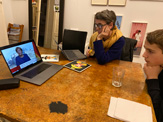
We don't have television, but yesterday we gathered around my laptop to see Angela Merkel's sombre address to the German people on the Corona crisis. She said what everyone needed to hear, very, very well. Just now I came across this article (in English) which describe how she did it. And what it means.
March 18, 2020 – "Ninth sheet"
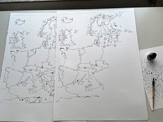
This is about today then, written today. Still I'm not sure what to say. A couple of hours ago Angelka Merkel spoke to the German nation: she said the current crisis is the most serious since WW2. That's quite a comparison, which can cause some nervousness. If I hadn't already used this title, I could call my new work: "Psycho-Mapping the Current Crisis". Which is really what I'm doing. Europe is changing and causing my hand to be unstable.
March 17, 2020 – "Eighth sheet"
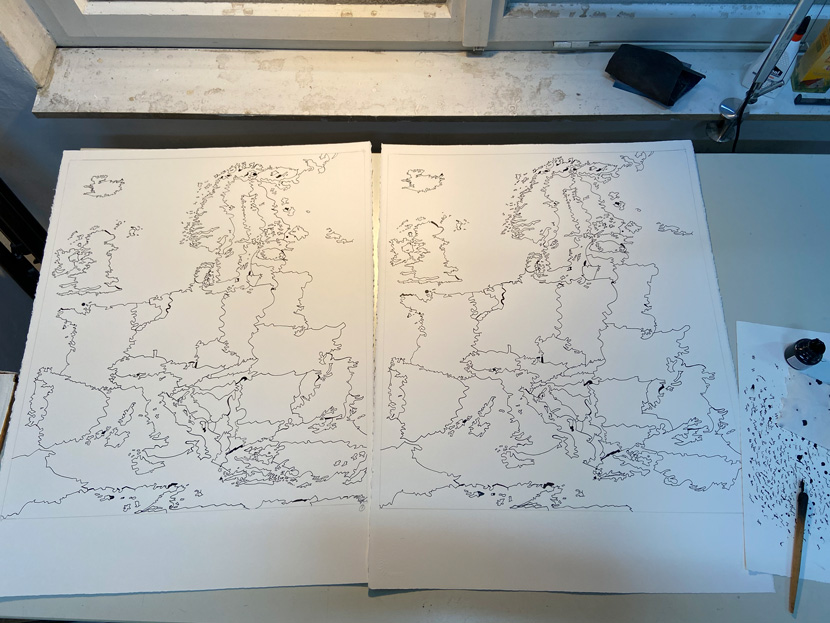
I'm writing this one day late. Time ran out yesterday. But when I try to think about what I thought then (which would be fitting to write about) I can't. There's a strange sensation theses days, of living in a very intense now.
March 16, 2020 – "Seventh sheet"
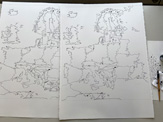
I'm writing this in my studio in Berlin at around 4 pm on the Monday, March 16. Noticing the time, I realize that since one hour all bars, cafés and restaurants in Austria have now closed, as they will continue to do as long as the current state of emergency is prolonged. I assume Germany will soon follow. The schools in Berlin will be closed from tomorrow, we'll see what's the next step.
I took the weekend off from drawing Europe maps. It feels like it was ages ago, Friday. This time is too dense with information and speculation, it makes the moment feel much longer. Yet I have only arrived at the sevenths sheet and have thirteen left. It's hard to keep a laserlike focus on copying lines, but I have to try. At this point so many problems have accumulated and built on one another, that the map looks more and more like a circus... which I have to continue to faithfully copy.
March 13, 2020 – "Sixth sheet"
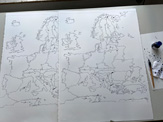
Austria will close down everything but bare necessities from Monday. Following Italy, but going far earlier. The exhibition we have been planning can't happen now. I saw the press conference live in my computer, during a break from working on the above drawing. (Afterwards I made a mess of Greece and I will have to live with the consequences for the following fourteen sheets). Against my instincts I must say that I was impressed with how Kanzler Kurz and two of his ministers presented the tough measures. Respectful and matter-of-fact, but not without empathy. I guess I have been following the nightmare of American politics for too long.
March 13, 2020 – "Friday"
In the morning. I just realized it is today the thirteenth day, in the month of March. A Friday.
March 12, 2020 – "Fifth sheet"
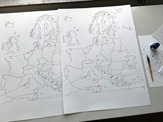
Europe is changing in front of my eyes. Both on paper and in reality. I wonder if the present crisis (and today it has not exactly gotten better, but I'll leave the details out) will eventually present opportunities to handle the long term structural problems which, in the end, are fundamentally more serious. Then I remind myself about my exhibition in Stockholm, which is still going on, and its title: "Monstrosities".
March 11, 2020 – "Fourth sheet"
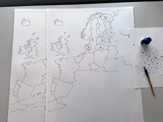
The exhibition next week will take place, although without an opening. Angela Merkel today said 50-70 % of Germans may eventually catch the new Corona virus. In Italy everything has been turned upside down, while some 10-15 000 out of a population of 60 million are sick. It's admirable, because it helps everyone else to buy time, adapt and lets more vulnerable people survive, but it is not sustainable in the long run. Eventually, the efforts will disintegrate and new forms will happen.
March 10, 2020 – "Third sheet"
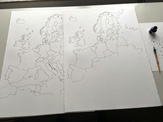
Mentioning chaos theory yesterday, the situation developed predictably (sic!!!) today. During a midday break from working on my third Psycho-Mapping sheet (copying as exactly and neutrally as possible the second sheet, including all the mistakes which happened against my best efforts yesterday), I learned that the Austrian government had just announced major cancelling orders, including all classes at universities. I am (I was?) due to go back to Vienna for a full week of work on Monday, including installing and opening an important show of student work, curated by myself, in Galerie Hilger Next. What now?
After having communicated with my colleagues at the department in Vienna, we waited for the announcement we knew would soon come from the Rector's office. And indeed it did, and it was harder than what I had imagined. The university will close down completely, as regards all physical meetings, from Monday until after Easter. Everything has to be conducted over electronic communications. Not exactly the best means for art education. As for our show, I am waiting to hear the gallery's decision. As from today, meetings indoors in Austria may not exceed 100 people.
More complexity than I had bargained for.
March 9, 2020 – "Complexities & Second sheet"
It's an interesting day today. Stuff's going on. Italy's premier is quoting Winston Churchill: "our darkest hour", having imposed a virus lockdown on a third of Italy's population. Saudi-Arabia had wanted an agreement in OPEC on production limits, in order to see oil prices rising. They didn't get it – so did the opposite: raised production in order to crash the market. Stock markets are bombing. Nobody is on top of this situation. Everybody – all leaders, all commentators – are deep into chaos theory land.
And I am working for the second day on a new Psycho-Mapping Europe series. The first one in ten years. Europe keeps changing – its psycho-mapping has to be updated. Today I have finished the second sheet, which is always the hardest and scariest. The first sheet (yesterday) is a tracing of an underlying map (using a light table). Demanding but not scary. Interesting (because also here decisi0ns will have to be taken: which islands to include, which lakes, what resolution for a border's squiggles), but not hard. The second sheet is completely different. Every mistake will be retained and magnified over the following sheets. So... make no mistake. Easy to say, impossible to avoid. Like everyone is finding out today. Navigating impossible lands.
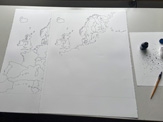
March 8, 2020 – "First sheet"
Today I drew the first sheet of the new Psycho-Mapping. I didn't make a photograph – and this post was added three weeks later. By then, I had realized that I wanted to preserve complete information of when each sheet in the series had been made. The chronology of the Psycho-Mapping has become wedded to the trajectory of the crisis. On March 8, I was not yet aware just how much turmoil this period would bring. Now, as I write on March 29, I don't know just how much worse it will become.
The first sheet in a psycho-mapping series is made in a different way than the following. I place the empty sheet on top of a correct map on a light table and trace it. It's more mechanic. Nevertheless, I managed to have a false start: on March 7, I made a first attempt at the tracing, using the dip pen which I have used for all the following sheets. I couldn't avoid some unfortunate thickening of lines and a a very small blob, however. I didn't want this type of deviance already from the beginning, so on March 8 I did the first sheet all over again, with another type of ink pen, which can't leave blobs.
February 29, 2020 – "Correction"
A virus is spreading and stockmarkets worldwide have been falling for the whole of last week. Chances are they will continue to do so. Could this be the beginning of a grand reset? A fundamental reality check, for us all – and especially for populist politicians? Where we all begin to realize that there are facts which cannot be denied and cannot be turned into their opposites? The jury is out.
A couple of hours after I wrote the above, I read this article: "The Coronavirus and how political spin has worsened epidemics".
February 21, 2020 – "Matters of taste"
When you see an article beginning like this: "I believe that analogies between current events and the Third Reich ought not to be made casually, if at all. Whenever it is claimed..." you get curious. In this case it's a text showing the devastating parallells between authoritarian politics of taste, in the Third Reich and... in the Trump administration. It's mainly about architecture.
I live in central Berlin, I see surviving examples of Third Reich politics of taste daily. Imagine that in 75 years time survivors in Washington and New York will be daily confronted with memorials to the taste of the current president. It's a chilling read.
February 18, 2020 – "Stockholm"
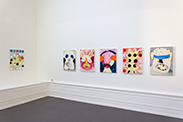
I went to Stockholm. The installation of the show went really smooth. Unusually for me, I had not planned it much in advance. Instead, I did it together with the gallerists, James and Eva-Lotta. We just played around with the works until we had found the "story" that the paintings seemed to have prepared for this particular room. It was a lighthearted and fun. In contrast to what is my own idea of what these works are about. More on that another day. Perhaps.
The opening was also nice. Lots of people came, including old friends I see very rarely. I had this surprised comment from a few: something about not having seen humor in my work before... Oh, well. What did you look at then? I have learned never to be surprised at any comment which is provoked by the work. After all, it's function is to be a catalyst. Still, I did find it a little odd to hear this humor comment right here, in front of these paintings. Are they fun?
As soon as the opening was over I was overcome with a terrible cold, which is keeping me in bed right now (back in Berlin). Yet in thiss horizontal position I have been working on my documentation, since long lacking. All the new paintings are now listed in their index, as are their drawings – and the installation views.
February 11, 2020 – "Monstrosities"


Here is the invitation for my show in Stockholm, which opens in a few days. See and read – and do come if you are in Stockholm. Paintings should be seen in the room in which they are.
February 10, 2020 – "Intelligence"
With yesterday's Beethoven discussion still on my mind I come on this stray thought: if your work is truly accomplished it will be smarter than you are. (Is this just an expression of romanticism?)
February 9, 2020 – "Nussberg"
I'm in Vienna on a Sunday, which is unusual. I spent the day reading (too much news, which makes me sick, currently) and working in my small apartment, except for a mid afternoon long run which took me on the route through the wineyards of Nussberg, where Beethoven used to walk when he lived just below, in Heiligenstadt. The path is exceedingly beautiful with the panorama of the city at your feet. I still can't believe my luck that it is possible to run here from my apartment and back. What a privilege! And the weather today... was not exactly February-like, but more like a crisp and sunny day in April. In my headphones I listened to a series of podcasts by the brilliant pianist Igor Levit, discussing Beethoven's 32 piano sonatas. In an easygoing way, he manages to combine technical matters (how the music is made, and in this case, how Beethoven often stretched what is possible to play and how he challenged the player by asking for super complicated passages to be played at incredible speed, sometimes arriving at a result which is no longer music but Geräusch – noise) with deep discussions of meaning and value, which do not stop at the edge of music. Like all classical virtuosi, Levit began studying piano intensely at a very young age and when he was eighth his parents moved the family from Gorki in Russia to Hannover, in order to optimize his education. There, he met a teacher who for years forced him to study the second sonata. It was all about the text, and how to transfer the text to sound. Technical matters, yes, but ultimately about the essence of what music (and all art) is. Transformation. For Igor Levit, the second sonata became the key to all music.
"Was ist ein bedeutendes Stück Musik? Bedeutendes, hat ein Freund von mir gesagt, wird es immer erst später" (What is an important piece of music? Important, a friend of mine has said, it only becomes later) after which Levit notes that nevertheless there exist some works which change everything at once, like Stravinsky's Rite of Spring... He then returns to Beethoven: "Was ich mich vorstellen kann, ist dass Beethoven sehr bewusst war, dass er mit diesem Art Auftritt, nicht nur bedeutend wird, sondern einfach behauptet: Ich bin bedeutend." (I imagine that Beethoven was very aware that with this kind of attitude he not only becomes important, but simply claims: I am important.)
I love Beethoven's piano music. I can play along with much of it in my head, in fragments but alive. Always loved it, together with Erik Satie's. I listen more often to Beethoven these days. It's incredible what he was able to construct. He may have been the first composer who believed in himself as possibly more important than his separate pieces of music, but still he put constructions together which keep being reimagined and re-transformed by people all over the world, again and again. Filling their lives with meaning, as well as their many audiences. Importance certainly happened, if immediately or after doesn't matter.
I have no teaching this time in Vienna, it is semester break. Tomorrow I will be working on a bio-art experiment with a colleague and on Tuesday I have meetings and then in the evening I will attend a long awaited concert. Music has become so important to me again, as a bulwark against depression and loss of faith, which easily result from observation and consideration these days. This time it's Babymetal in Gasometer. Very different from Beethoven? Yes and no. I would never have fallen for this band if it wasn't for the compositions. Their best songs are incredibly complex and emotionally rich constructions, which have become etched into my mind since I first learned about them two years ago. To understand what I mean, go here and listen to the whole seven minutes of Ijime, Dame, Zettai without watching. Accept the speed, remember Beethoven, remember Geräusch. See the construction, listen to the details of the delivery. Then play again and watch. Enjoy the confusion, if this is your first time.
I have written an essay about this song and video, for an anthology with 25 writers, called "Hur låter Japan?" (What does Japan sound like?). It will be published by BCNVT in Sweden later this year. It's an important text for me.
January 25, 2020 – "Fog"
Last night, I arrived in Paris covered by thick fog. It was very still. Because of the strikes I was expecting all sorts of problems regarding transportation, but there was none. I met my friend Anne B. We had dinner and this morning we visited the exhibition "Tableaux Magiques" at the Musée Picasso. It's curated by Marilyn McCully and Michael Raeburn, who are also my friends – and I have been waiting to see it for months already. And I wanted to like it, even before seeing it, and was a little worried that this would not be the case.
Picasso is like... old school. Had there been Metoo back in his day, he would surely had problems. The world has moved on. Art has moved on. We have other problems.
I didn't need to. We do have other problems and concerns, yes. But the magic of a really good show is indeed transportation. You enter a carefully constructed world, which comes alive in you. I loved those paintings and their hyper activated language of signs. It felt like seeing all of them for the first time, also those I already knew.
I then spent the rest of the day walking alone through the city. I saw burned Notre Dame. I saw places I know from so many times before. I have my memories. I felt happy I live in Berlin.
January 11, 2020 – "Waiting"
I'm in my studio, it's 2020 and the second Saturday morning of the new year and I am waiting for a transport to arrive. I'm sending paintings for my show at Galleri Flach in Stockholm. It will not open until February 15, but the work is finished and I'm happy to have it go. Last Monday I de-installed the show of prints at Bildraum01 in Vienna and these last weeks I have focusing not only on preparing my own show, but one of my students as well, at Hilger Next in Vienna. Fourteen of them, in an impressive white cube space. It will open in March and it is important for all of us. I'm stepping in and out of roles: artist, technician, teacher, curator, writer. There are other projects to attend to as well, relating to university or my own trajectory. Keep working. Try to do it right. Keep it all going. Try to build on what you have, to make it new and yet to be a development towards a better state. I like that idea: to make it new – from what you already have. Looking forward into the unknown, while seeing consistency and even logic when looking back. The title of my show in Stockholm will be "Monstruösiteter". Translated: Monstrosities. The noun doesn't really exist in Swedish, although the adjective does. The plural noun looks so ugly it becomes fascinating, and it's really hard to spell. I have become attached to this word. We already used it for a student show in Vienna at the end of 2018: "Monstrositäten".
